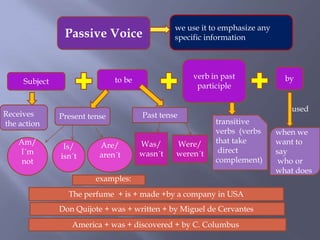Passive voice[1]
•Download as PPTX, PDF•
0 likes•50 views
The document discusses the passive voice in English grammar. The passive voice uses a form of the verb "to be" along with the past participle of the main verb, and places the recipient of the action at the subject rather than the doer. It is used when the doer or subject is unknown, unimportant, or already obvious from context. Examples are given of sentences rephrased from active to passive voice.
Report
Share
Report
Share

More Related Content
What's hot
What's hot (19)
UTPL-COMMUNICATIVE GRAMMAR III-I-BIMESTRE-(OCTUBRE 2011-OCTUBRE 2012)

UTPL-COMMUNICATIVE GRAMMAR III-I-BIMESTRE-(OCTUBRE 2011-OCTUBRE 2012)
Similar to Passive voice[1]
Similar to Passive voice[1] (20)
Passive voice[1]
- 1. we use it to emphasize any specific information PassiveVoice verb in past participle by to be Subject used Present tense Past tense Receives the action transitive verbs (verbs that take direct complement) when we want to say who or what does Was/wasn´t Were/weren´t Am/ I´mnot Are/ aren´t Is/ isn´t examples: The perfume + is + made +by a company in USA Don Quijote + was + written + by Miguel de Cervantes America + was + discovered + by C. Columbus
- 3. The passive voice often used when interest is unknown or not mention who or what does the action.
- 4. We use the passive voice with transitive verbs when the focus is the object.
- 5. The verb to be can be omitted only this when in present
